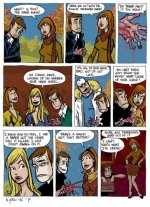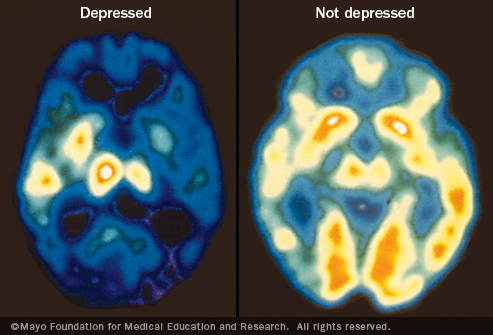21%
You have a choice!
- Joined
- May 15, 2009
- Messages
- 3,224
- MBTI Type
- INFJ
- Enneagram
- 4w5
I've been thinking of this issue lately, though maybe not exactly in the normal sense. A few months ago I was at a huge family gathering. My 3-year-old cousin tripped and fell and was about to cry. Her mother immediately went up to her and picked her up, all the while saying in mild baby-talk "It's ok. It doesn't hurt, right? Nooo, it doesn't hurt at all!" The girl seemed a little confused as she thought about it and decided not to cry. A minute later she was happily running around again.
This did not use to happen when I was young. I remember the typical adult response to a kid falling was something like "Are you ok? Show me where it hurts. There, let me kiss it. Better?". I could not help but feel that this response, if used with my 3-year-old cousin, would have produced a different effect. She most likely would have cried as she perceived that the 'pain' was 'real'.
I know this seems a really small matter, but I remember seeing on Dog Whisperer blush
blush how a puppy became hydrophobic after he fell into a pool and the owners 'made a big deal out of it' because they were afraid he was going to drown. Instead, if they had done nothing, the puppy's natural instinct would have kicked in and he would have started swimming.
how a puppy became hydrophobic after he fell into a pool and the owners 'made a big deal out of it' because they were afraid he was going to drown. Instead, if they had done nothing, the puppy's natural instinct would have kicked in and he would have started swimming.
The human mind is weird in that sometimes "having a name for something" can make it real. Labeling something with a term with a positive or negative connotation can have an effect on how people perceive the matter, e.g. the classic "terrorists" vs "freedom fighters".
Maybe this has an effect on our health as well. I have perceived a few cases where elderly people who are diagnosed with cancer pass away shortly afterwards, sometimes within a few months. One of my friend's grandpa, on the other hand, was never told he had cancer with only a year to live (according to the doctor), and is still alive and well twenty years after.
This is hardly empirical evidence, but I think that maybe when we label something as an illness, it really becomes an illness. It can make people panic and think "OMG, I'm so sick and I'm going to die", and that can have detrimental effects on the treatment.
I think the same goes for mental illness. I'm not saying that mental illness is not real. I believe it is, and people should receive treatment for it. However, I have to say I don't agree how therapists are so easily giving out prescriptions for just about anything. In a way, I think it reinforce the view that they are "sick" to the patients, and might make them start to believe certain things about themselves and perhaps even identify themselves by their conditions.
I attended a course on neuro-linguistic programming once, and the presenter said he got someone to successfully quit smoking by having her identify herself as being 'a non-smoker who sometimes smokes'. I don't believe this works for everything, but I think it has its merits.
I don't have any specific questions or specific points to make. This is still quite vague in my head, but I'm starting to think that this may be the key to solving a lot of what we perceive as 'problems'. If we start thinking about 'problems' as 'exciting and challenging things that we get to do', will they actually cease to be 'problems'?
This did not use to happen when I was young. I remember the typical adult response to a kid falling was something like "Are you ok? Show me where it hurts. There, let me kiss it. Better?". I could not help but feel that this response, if used with my 3-year-old cousin, would have produced a different effect. She most likely would have cried as she perceived that the 'pain' was 'real'.
I know this seems a really small matter, but I remember seeing on Dog Whisperer
The human mind is weird in that sometimes "having a name for something" can make it real. Labeling something with a term with a positive or negative connotation can have an effect on how people perceive the matter, e.g. the classic "terrorists" vs "freedom fighters".
Maybe this has an effect on our health as well. I have perceived a few cases where elderly people who are diagnosed with cancer pass away shortly afterwards, sometimes within a few months. One of my friend's grandpa, on the other hand, was never told he had cancer with only a year to live (according to the doctor), and is still alive and well twenty years after.
This is hardly empirical evidence, but I think that maybe when we label something as an illness, it really becomes an illness. It can make people panic and think "OMG, I'm so sick and I'm going to die", and that can have detrimental effects on the treatment.
I think the same goes for mental illness. I'm not saying that mental illness is not real. I believe it is, and people should receive treatment for it. However, I have to say I don't agree how therapists are so easily giving out prescriptions for just about anything. In a way, I think it reinforce the view that they are "sick" to the patients, and might make them start to believe certain things about themselves and perhaps even identify themselves by their conditions.
I attended a course on neuro-linguistic programming once, and the presenter said he got someone to successfully quit smoking by having her identify herself as being 'a non-smoker who sometimes smokes'. I don't believe this works for everything, but I think it has its merits.
I don't have any specific questions or specific points to make. This is still quite vague in my head, but I'm starting to think that this may be the key to solving a lot of what we perceive as 'problems'. If we start thinking about 'problems' as 'exciting and challenging things that we get to do', will they actually cease to be 'problems'?






 I'll keep this in mind when (and if) I have kids of my own.
I'll keep this in mind when (and if) I have kids of my own.